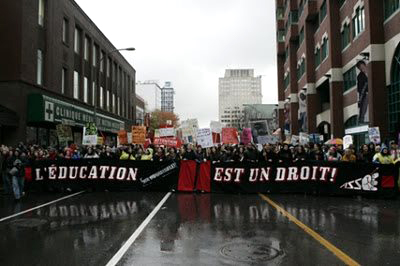
On 22 May 2012, up to 500,000 people took to the streets of Montreal to mark 100 days of student strikes in the Canadian province of Quebec. The strikes are led by the radical student-union coalition CLASSE (La Coalition large de l’ASSÉ), involving up to 200,000 students in the province. There have been nightly demonstrations in Montreal and violent confrontations between students and the police. The determination of Quebec students to resist plans to restructure education has received support from airline workers whose jobs are under threat, with whom the students have also expressed solidarity. High school students have also taken part in the strike.
The struggle relates to plans to restructure university education in Quebec. In the spring of 2011, the Liberal government of Quebec announced annual tuition increases of $325 over the next five years, bringing tuition costs to $3793 per year for every full-time university student, an increase of 75%. This is after tuition costs have increased over the last 5 years by 30%, ultimately representing a 127% increase over ten years from $1668 to $3793 per year. At the same, the amount of grants and research contracts allocated to universities has more than doubled between 1996 and 2006, from $721 million to $1.276 billion in constant 2006 dollars. The fields of health science, pure science, and applied science have received 75.8% of this funding, with the money being increasingly used for applied or marketable research as businesses turn to universities to sub-contract out their research.
Since the winter, more than 150 student unions voted in favour of strike action. Throughout the 14 weeks of the strike, there have been regular demonstrations throughout Quebec as up to 200,000 students have been on strike. On 22 March, up to 200,000 students marched through Montreal. The attempts to use court injunctions to end the strikes and demonstrations were met by students marching on Montreal Court House on 19 April, forcing officials to close the building for the day while riot police used pepper spray to disperse the students. The protests have increasingly faced police violence, with police using rubber bullets, sound grenades, and tear gas against several hundred students at a protest outside of the Liberal Party’s general council meeting in Victoriaville on 4 May. One student required surgery and lost sight in one eye after allegedly being shot in the face by riot police. 106 students were arrested that night.
On 14 May, the Quebec Education Minister Line Beauchamp resigned from her position, stating that she believed she was not helping to solve the problem. The replacement, Treasury Board President Michelle Courchesne, who previously held the post of Education Minister from 2007 until 2010, has made it clear that the government of Quebec has no intention of backing down. The government of Quebec has attempted negotiations throughout the period to end the strikes, with an offer on 5 May to drop mandatory institutional fee increases in equivalence to fee increases but with fee increases over the next 7 years fees of $254 annually, ultimately leading to an increase of $1778. However, over half of the students have voted in favour of continuing the strike, with 342,000 students voting against the government’s last offer, including 115 unions not on strike but who voted to express their opinions. Only 4,600 students voted in favour of the Quebec government’s offer.
.Academic staff have shown solidarity with the students, with different branches of the Canadian Union of Public Employees (CUPE) showing support. CUPE 3906 general membership, made of contract academic workers at McMaster University in Hamilton, Ontario, voted in favour of a $10,000 donation to CLASSE, whilst CUPE 3902, the union representing teaching assistants and course instructors at the University of Toronto, voted to donate $20,000 on 10 April. On 25 April, a day of solidarity with the student strikes, 1000 red squares, the symbol of the student strikes, were handed out to workers at Pearson Airport in Toronto. In Montreal, 3 different marches descended on the Museum of Fine Arts where ACE Aviation Holdings Inc were holding a meeting, with students, community groups, and airline workers uniting to protest against the decision to payout hundreds of millions of dollars to share-holders instead of using the money to erase part of the $2 billion deficit in the employee’s pension plan. Throughout Canada, there was a co-ordinated 1-minute work stoppage –standing up, stopping answering phones and putting on red squares- by Air Canada call-centre employees in solidarity with the strike.
The government of Quebec has announced plans to use greater force to end the strike. On 18 May, it passed Bill 78, which establishes extremely high fines for anyone who pickets or tries to block access to schools and university campuses and which places restrictions on where and how many people may protest. The hard-line of the Quebec government could result in blood on its hands, and students have responded to Bill 78 and use of riot police by intensifying the nightly protests in Montreal and other cities.
As the Mouvement Étudiant Révolutionnaire (MER – Revolutionary Student Movement), a group associated with the Maoist PCR-RCP, which has been involved in organising and mobilising for the strikes, declared in March:
“The victory of the student strike will depend upon the capacity of the most militant sectors of the student movement –those who identify themselves with the interests of the popular masses – to keep the initiative and make the bourgeoisie and its state apparatus pay the price!”




